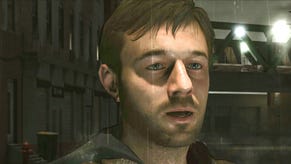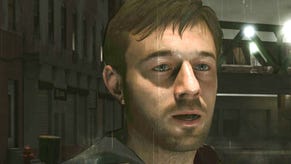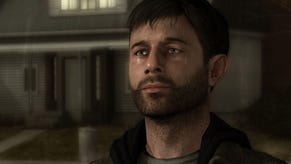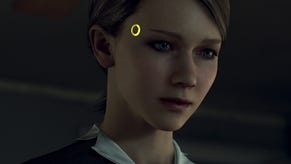Heavy Rain
Pored over.
How far would I go to save someone I loved? Apparently, I'd start by letting them win. The first thing that happens in Heavy Rain is that you take control of architect Ethan Mars as he wakes up on a beautiful Saturday morning in his lovely modern family home, gets dressed and goes downstairs to wait for his wife and children to come back from the shops. When they do, he helps get stuff ready for lunch and then has a bit of time to kill, so he goes and plays in the garden with sons Shaun and Jason.
Heavy Rain is easy to pick up and play, but at this stage you are still effectively in one of those playable tutorials, doing things like depressing triggers at varying speed to see how much you can influence the speed of animation (a lot). At this stage in any game the goal is to do what you're told while events warm themselves up in step.
What sets Heavy Rain apart, however, is that while I'm having a mock lightsaber fight with my kids in the garden, I remember it's better to let kids win. So I deliberately fudge some button prompts, "failing" by any traditional gaming yardstick, take a few mock blows and tumble dramatically to the floor to Shaun and Jason's great delight. To my great delight as well - Heavy Rain isn't a mature game because it has unhappy families and moody lighting, it's a mature game because it anticipates an adult response from the player and is prepared to receive it.
Unlike past previews, for the first time we are getting to play through an extended section of Heavy Rain. Other publishers are very protective of their blockbuster games, revealing them in dribs and drabs - the apex of which remains Activision's decision to show journalists a mere two minutes of Modern Warfare 2 at gamescom in Cologne two months prior to its release - so today suggests Sony is rather proud of Heavy Rain, because this preview build is over two hours of continuous play.
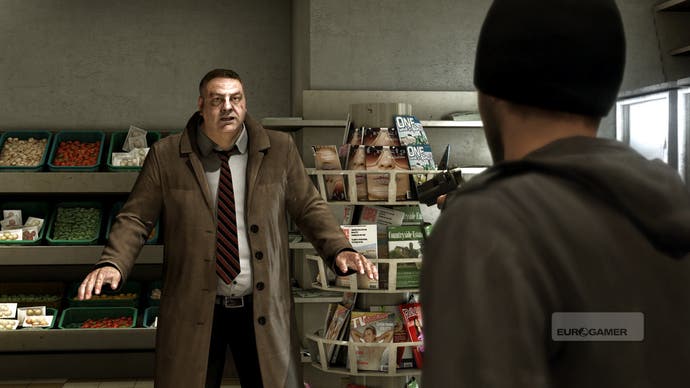
It allows us to observe how the game introduces its four playable characters and the concept of the Origami Killer, and how it reconciles the seemingly mundane - like taking your kid to the park - with events far more out of the ordinary. Following the prologue, the game sticks with Ethan Mars as we experience the pivotal event in his life: the death of his son Jason. It's a shattering blow, as it must be, and it forces Mars and his wife Grace to separate. We meet him again as he struggles to reconnect to his distant, remaining son amidst the fog of depression.
As Infinity Ward demonstrated recently with its "No Russian" level in Modern Warfare 2, it's very difficult to introduce powerful, emotional themes and social commentary into a videogame, even when you're one of the world's foremost game developers with two of the biggest-selling releases of all time on your CV. So it's important to bear in mind the scale of Quantic Dream's ambition: Heavy Rain's initial theme of coming to terms with personal tragedy isn't just a convenient sob story backdrop to a game of combining items and solving puzzles; this, it seems, is the game.
And to this end the developer is simultaneously bold and delicate, perhaps best illustrated by the gentleness of the other three playable characters' introductions. You adapt to private detective Scott Shelby's calm, polite investigative style as comfortably as you put on your favourite jacket. When his first interviewee gets into trouble and he is forced to defend her from an attacker, he never slips out of the character you've just seen defined. His physical appearance and manners bespeak quiet courage and personal responsibility, and his actions do little to disturb the measured start of the game, even though they are its first acts of violence.
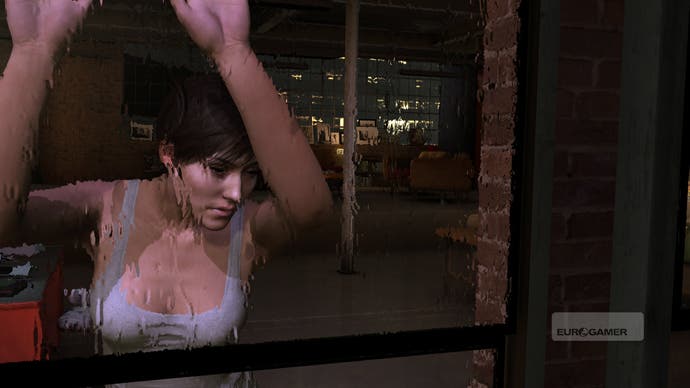
FBI profiler Norman Jayden, meanwhile, arrives in a car at a crime scene, calmly presents his credentials and then attempts to investigate without treading on the toes of cops who plainly consider him to be an unwelcome burden, summoned by forces beyond their control. He also appears to be masking withdrawal symptoms - but of course this is less of a problem in the pouring rain and dismal light beneath a highway overpass, so the game can save his flaws for later. We see the least of Madison Paige, the last playable character to be introduced - her "Sleepless Night" scene is the final one in our preview build - but her initial performance frames her restlessness and hints at creeping fear and isolation.
Quantic Dream has spoken repeatedly of its desire to provoke an emotional response within the player, and there are a number of occasions within the opening few hours that worked on me. I've written before about the unhappy memories Ethan Mars' descent into depression raked over; the house he moves into after Jason's death is furnished with the same disinterest I remember from my dad's first place after my parents separated. It wasn't until later that the green shoots of pride began to emerge in redecoration and the resumption of hobbies, but Ethan's still buying microwave dinners for his son; the prologue suggested he was the breadwinner and thoughtful father, but evidently he wasn't the cook.
But it's not just the bleak aftermath of tragedy and divorce that resonates. Anyone who has ever given up smoking would recognise Norman Jayden's frustration as his body insists it must have something he knows in his heart he must deny it, even if smoking's a slightly less extreme example. And surely everyone has cursed him or herself for getting out of bed to investigate a noise elsewhere in the house, as Madison Paige does, and then thought about what the event implies.




